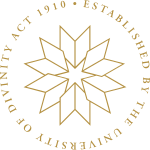 | |
| Latin: Universitas Divinitatis | |
Former name |
|
|---|---|
| Type | Collegiate theological university[2] |
| Established | 1910[3] |
| Accreditation | TEQSA |
Religious affiliation | Christian denominations |
| Chancellor | Graeme Blackman |
| Vice-Chancellor | James McLaren |
| Location | , |
| Campus | National collegiate with multiple sites[5] |
| Colours | Red Gold |
| Website | divinity.edu.au |
 | |
The University of Divinity is an Australian collegiate university with a specialised focus in divinity and associated disciplines. It is constituted by twelve theological colleges from seven denominations and three schools. The University of Divinity is the direct successor of the second oldest degree-granting authority in the State of Victoria, the Melbourne College of Divinity. The university's chancery and administration are located in Box Hill, a suburb of Melbourne in the state of Victoria.
The Melbourne College of Divinity was constituted in 1910 by an act of the Parliament of Victoria. The act was amended in 1956, 1972, 1979, 1990, 2005 and 2016 and is now known as the University of Divinity Act 1910 (previously the Melbourne College of Divinity Act 1910).[6][7] From its beginnings the college was a self-accrediting issuer of degrees, while not becoming a university until 2011. Representatives appointed by several churches formed the college to provide tertiary level theological education. The first president was the Right Reverend Henry Lowther Clarke, Anglican Archbishop of Melbourne, and the first registrar was the Reverend John Mathew, Moderator of the Presbyterian Church of Victoria.[8]
In 2010, the Melbourne College of Divinity applied to the Victorian Regulation and Qualifications Authority for approval to operate as a self-accrediting "Australian University of Specialisation"[9] (a category of higher education provider[10]). The Victorian government announced on 30 August 2011 that the application had been approved and on 1 January 2012 the college began operating as a university. Peter Sherlock was appointed the inaugural vice-chancellor in April 2012.[9] In May 2019 TEQSA extended the seven-year licence to operate as a university for an additional three years to the maximum possible of ten years before a review. On 1 July 2021, TEQSA changed the provider category of University of Divinity from Australian University of Specialisation to Australian University, with self-accrediting authority in the broad field of Society and Culture’.[11]
In the 2022 Student Experience Survey, the University of Divinity recorded the highest student satisfaction rating out of every Australian university, with an overall satisfaction rating of 91.[12]
- ^ https://divinity.edu.au/about/history/
- ^ https://divinity.edu.au/about/colleges-and-schools/
- ^ https://divinity.edu.au/alumni/
- ^ https://divinity.edu.au/about/colleges-and-schools/
- ^ https://divinity.edu.au/about/colleges-and-schools/
- ^ "University of Divinity Act 1910, section 35". austlii.edu.au. Archived from the original on 13 April 2019. Retrieved 18 October 2023.
- ^ "University Act". divinity.edu.au. Archived from the original on 16 March 2020. Retrieved 18 October 2023.
- ^ "University of Divinity: History". Archived from the original on 7 February 2020. Retrieved 7 February 2020.
- ^ a b "MCD achieves specialist uni status". The Australian. Retrieved 20 September 2020.
- ^ "Australian higher education". Universities Australia. Archived from the original on 19 September 2020. Retrieved 20 September 2020.
- ^ "Provider Category Change 1 July 2021. Provider: University of Divinity (formerly Melbourne College of Divinity)". TEQSA. Retrieved 16 November 2023.
- ^ "Student Experience Survey". QILT. Retrieved 16 November 2023.
© MMXXIII Rich X Search. We shall prevail. All rights reserved. Rich X Search
